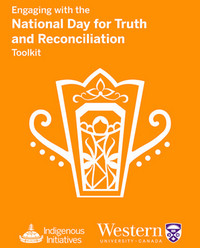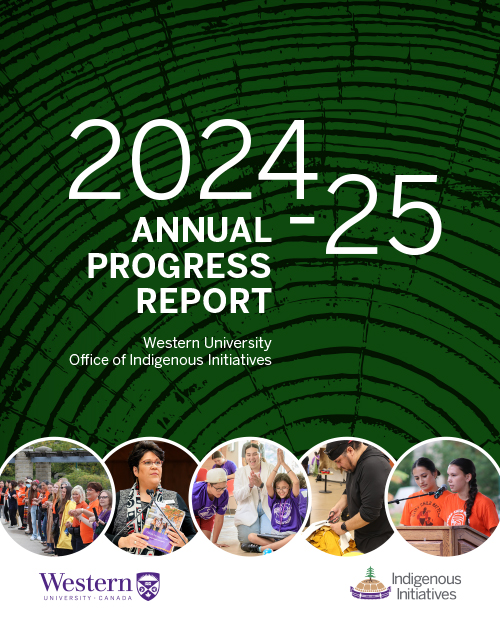Observing the National Day for Truth and Reconciliation

National Day for Truth and Reconciliation 2025
The annual observance of National Day for Truth and Reconciliation (NDTR) will be observed at Western University on Tuesday, September 30, with events honouring the day spanning throughout September and into October
Western has designated September 30 as a non-instructional day, which means no regularly scheduled classes will be held. This will allow everyone within the learning community to engage with targeted events planned for the day, led by groups across campus and the London area.
While NDTR is one day observed annually, the work of Truth and Reconciliation must be embraced daily by all units to foster meaningful and lasting change.
Please direct any questions to indigenousinitiatives@uwo.ca
OII-led NDTR Events
Monday, September 29 from 10 a.m. to 12 p.m.Orange Shirt Flag Raising Ceremony at the University Community Centre’s Concrete Beach
- Elders, Indigenous community leaders and campus leaders speaking to the importance of Truth and reconciliation at Western.
- A traditional drumming group during the ceremony
- Open to everyone
- Learn more
Sunrise Ceremony at the Wampum Learning Lodge
- Sunrise Ceremony led by Elder Mike Hopkins
- Long skirts will be admired, but not required
- Breakfast & refreshments to be served after the sunrise ceremony (while supplies last)
- Sacred fire to remain lit until 2 p.m., all visitors welcome throughout the day to pay respects and offer prayers
- Open to everyone
- Learn more
NDTR Events Across Campus
Month of SeptemberRiverfest 2025
- Co-organized by the Indigenous Students' Association, Indigenous Student Centre and Western Sustainability
- Celebrate and connect with Deshkan Ziibi (Thames River), an integral part of Western's natural heritage
- Includes many events such as Paint Night by the River, BioBlitz London, and an Anishinaabe Water Walk
- Learn more about Riverfest25
Thursday, September 11 at 12 p.m. to 1 p.m.
Grand Rounds – Indigenous Planetary Health with Dr. Nicole Redvers
Auditorium A, University Hospital (Hybrid via Zoom)
- Dr. Nicole Redvers will explore the health burden of global environmental changes
- Define planetary health through Indigenous perspectives
- Discuss physicians’ roles in planetary health within health systems
- Open to all; no registration required
- Learn more from Schulich
Art Thrive: Water | Fluidity
McIntosh Gallery
- Water systems are often visualized as a stream or a flow, an elemental force that is in constant motion. Our program Water | Fluidity features new media work Underwater Magic World by Cassie Packham (2025) and Canoeing the Black Creek by Dave Kemp (2023).
- Cassie Packham is an Onyota'a:ka (Oneida) artist born and raised in Mi'kma'ki (Nova Scotia).
- Artmaking Activity: Silkscreening tote bags with Soft Flirt.
- Learn more from McIntosh Gallery.
Currents of Change ("Fridays at 12:30" concert series)
von Kuster Hall, Music Building ( Livestream available)
- This program explores the themes of water and water rights through music.
- Featured performers soprano Lucy Fits Gibbon (Bard College Conservatory), violinist Sharon Wei and cellist Zachary Mowitz (LA Philharmonic) will premiere Juantio Becenti's work based on Supreme Court rulings and Navajo water rights.
- Also on the program are Nick DiBeradino's piece for cello and electronics, reflecting coral reef decline, and Ian Cusson's solo viola work La Pieta, inspired by Kent Monkman's painting of Indigenous water protectors.
- No registration required, free to attend
- Learn more about Currents of Change
‘Not the Right Thing To Do, The Only Thing To Do: How Indigenous Education Will Save The World’ Talk by Dr. Niigaan Sinclair
Joanne and Peter Kenny Theatre, King’s University College (266 Epworth Avenue, London)
- Dr. Niigaan Sinclair is an award-winning writer, professor of Indigenous Studies at the University of Manitoba
- Author of bestseller Wînipêk: Visions of Canada from an Indigenous Centre
- This talk will explore how Indigenous education is vital for reconciliation and building a more just, hopeful future.
- Learn more
DARAO Speaker Series: Indigenous Health Equity
Online
- Hear from Sara Mai Chitty, Benny Skinner, and Gabrielle Heil on Indigenous health equity, pedagogy, and research
- Hosted by the Decolonization, Anti-Racism, and Anti-Oppression (DARAO Committee at the Arthur Labatt Family School of Nursing
- Free and open to all; registration required.
Wednesday, September 24 at 1 p.m. to 4 p.m.
Art Thrive: Water | Remembering
Weldon Library Scholar’s Lab
- In Water | Remembering this series of short films explore how familial and ancestral bonds are cultivated with and through connection to the natural environment, specifically through water systems.
- Work by Indigenous filmmakers: Cole Forrest (Nipissing First Nation), Evelyn Pakinewatik (Nipissing First Nation) and Amanda Strong (Red River Métis/Manitoba Métis Federation)
- Artmaking Activity: Silkscreening t-shirts with local artist Flourish and Grow. Watercolour painting.
- Learn more from McIntosh Gallery.
Allied Scholarship in Indigenous Research Panel: Reflections, Responsibilities, and Realities
Wampum Learning Lodge
- Organized by Western Research
- Panelists: Dr. Evan Bowness (Geography & Environment), Dr. Brian Branfireun (Biology), Dr. Lisa Hodgetts (Anthropology), Dr. Desmond Moser (Earth Sciences)
- Moderated by Dr. Alison Allan (Western Research)
- Panelists will share personal insights from their experiences working with Indigenous Peoples, focusing on lessons learned, ethical considerations and the responsibilities of respectful collaboration.
- The conversation will examine the challenges of conducting reciprocal research within academic systems that often prioritize traditional success metrics like publication, funding and tenure.
- Attendees will gain practical guidance on how allied scholars can contribute meaningfully by honouring community priorities, cultural protocols, long-term commitments and navigating institutional pressures.
- Register for the event
Concert: Commemorating the National Day for Truth and Reconciliation
Paul Davenport Theatre, Talbot College, Western University
- Organized by the Don Wright Faculty of Music, funded by the Deans of Western.
- This event will feature solo performances by alumni Emma Pennell and Evan Korbut, and Master's student Rebecca Crane as well as selections performed by the Western University Singers under the direction of Dr. Mark Ramsay.
- All are welcome, No tickets or RSVP required. Attend and enjoy.
- Learn more about the event.
Afternoon of Allyship
Social Science Centre (SSC) Room 2050
- Co-organized by the Faculty of Social Science and the Faculty of Science.
- Reflect on what allyship means as a student, supervisor, researcher or leader at Western.
- Speakers include: Dr. Christy R. Bressette (Office of Indigenous Initiatives) presenting on Braiding Truth Into Action: A Guide Towards Indigenous Allyship at Western University; Drs. Lindsay Bell and Tania Granadillo (Anthropology) speaking on "Availability without Expectation: Allyship in Indigenous Language Reclamation; and, Dr. Desmond Moser (Earth Sciences) speaking on "Allying Western Science with Indigenous Priorities"
- A light lunch will be served at 12 p.m. for the first 75 attendees
- Learn more about the event
Film Screening & Director's Talk: Return of the Spirit Horses
Schulich Hall, Frank Holmes Centre, Huron University College
- Opening Ceremony led by Mary Lou Smoke (Elder-in-Residence (Wampum Learning Lodge)).
- Special screening of Return of the Spirit Horses with filmmaker Derek Sands (Walpole Island First Nation), celebrating Indigenous resilience and cultural restoration while inviting our community to reflect on healing, tradition, and the enduring bond between people and the land.
- This film follows an Indigenous filmmaker as he reconnects with the stories of his youth through the once nearly extinct Ojibwe Spirit horses. Guided by his father, a Residential School Survivor of Walpole Island, and joined by Indigenous students learning from an Elder, and community members, they unravel their history and the deep, personal bond they share with the horses, which once rode freely.
More to be announced!
Missing your event? Submit your on-campus event details to indigenousinitiatives@uwo.ca
Engaging with the National Day for Truth and Reconciliation Toolkit (2025)
The Engaging with NDTR Toolkit was updated for 2025. Please review for guidance for better understanding NDTR, leading up to NDTR and new information that was added for last year.

What can students do?
- Amplify NDTR messaging and events on social media from OII and Western Communications, other Western units, & local First Nations and Indigenous organizations;
- Attend events hosted by your faculty/department to learn how the work of Truth and Reconciliation applies to your area of study and future careers
- Wear orange and attend the September 29 Flag-Raising Ceremony and Sept 30 Sunrise Ceremony to show your solidarity
- Ask your leaders how they have actioned the Indigenous Strategic Plan
- Join the Indigenous Student Association as an allied member
- Take an Indigenous Studies course to learn more
What can faculties, departments and support units do?
- Amplify NDTR messaging and events on social media from OII and Western Communications, other Western units, & local First Nations and Indigenous organizations;
- Host discipline-specific NDTR events that support the learning and work of Truth and Reconciliation for your staff, faculty, and students;
- Invite Indigenous speaker(s) to classes, departments or offices to share their perspectives and stories for meaningful engagement opportunities;
- Sponsor exhibits on Indigenous histories, cultures, foods, traditions, leadership & art;
- Review the Truth and Reconciliation Commission’s Calls to Action and Principles for Truth and Reconciliation and Western’s Indigenous Strategic Plan from 2016 and identify how they apply to your department or unit;
- Promote Orange Shirt Day for the Flag Raising Ceremony on September 29 and NDTR on September 30 (orange shirts will be available for sale at the Bookstore on campus)
- Inviting staff and/or faculty to complete the 4 Seasons of Reconciliation Module available on the Wampum Learning Lodge website.
Additional guidance to inform and support campus initiatives:
- 12 ways to engage in Truth and Reconciliation at Western
- More than Words – A Guide to Land Acknowledgements at Western University
- Working with Indigenous Community members
- Guide for working with Indigenous students
- Indigenous Allyship at Western
- 2024-2025 Annual Progress Report by the Office of Indigenous Initiatives
Additional learning opportunities:
Free Educational Programming – Teachers & Students Grades 1-12
National Centre for Truth and Reconciliation
Pre-Recorded Content: To assist teachers, NCTR is offering Taking Truth to Action, a week-long educational program open to all schools across Canada, that supports free, age-appropriate, education curriculums for students in grades 1–12.
Hybrid Sessions: Hybrid sessions will be hosted in different regions in Canada where a small group of in-person students will join an expert matter speaker for a 20 to 30-minute session that may include a lesson/presentation and/or activity and open Q&A. Classrooms can watch and engage with these sessions virtually and participate in the Q&A.
Youth Empowerment Gathering – September 18 at 11:30 a.m. (ADT)
National Centre for Truth and Reconciliation
“The Gifts We Carry” is the theme of this year’s 90-minute live educational gathering, celebrating the strengths, stories, and resilience within Indigenous communities. The event honours Residential School Survivors through powerful storytelling, music, dance, and cultural expression. Students will engage with Survivors, Elders, artists, and knowledge-holders, opening meaningful dialogue about the truths of Canada’s residential school system.
Lunch & Learns – September 22 to 26
National Centre for Truth and Reconciliation
Join a compelling series of daily Lunch and Learn webinars that invite participants to critically examine and unlearn the myths of colonial history in Canada. These virtual sessions are open to the public and intended for an adult audience. Each webinar will be hosted via Zoom and streamed live on YouTube. Sessions feature expert speakers delivering 40–50 minute presentations, followed by a moderated Q&A. Simultaneous interpretation will be available in English, French, and American Sign Language (ASL).
Live Broadcast from Parliament Hill – September 30 at 3 p.m. (EDT)
National Centre for Truth and Reconciliation
In honour of the fourth annual National Day for Truth and Reconciliation (NDTR), APTN, the National Centre for Truth and Reconciliation, CBC/Radio-Canada and the Algonquin Nation have united to produce a 90-minute multilingual commemorative gathering, entitled Remembering the Children: National Day for Truth and Reconciliation.

